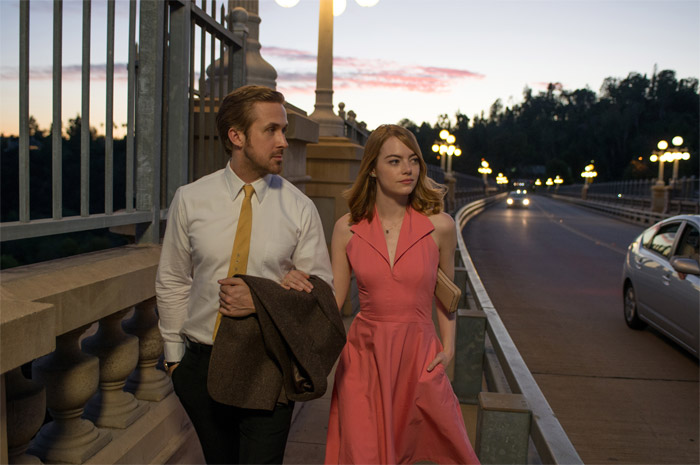Directed by Damien Chazelle
Picturehouse, Liverpool
From 13th January 2017
Reviewed by Nick Daly
It’s clear to understand why countless five-star reviews extravagantly blazon the film poster for La La Land, as it is essentially a film critic’s dream. It’s a film about film itself created specifically for film lovers, and after a career of dissecting and analyzing an innumerable amount of them; it must be a certain thrill for a critic to witness one being deconstructed before their very eyes.
La La Land first seizes a classic film genre and contorts it, re-imagining the Old Hollywood musical by juxtaposing a contemporary Los Angeles setting with the heightened whimsical reality of those early 20th century productions, straddling the two contrasting eras in such an expert manner that they somehow miraculously harmonize.
The musical sequences are delightfully executed, with exhilarating Baz Luhrmann-esque camera swoops capturing charming choreography amongst sumptuous set designs that are doubtlessly littered, Tarantino-like, with suitable film references. It’s near impossible not to be enraptured by this, as La La Land’s infectiously joyful tone, combined with its sublime filmmaking aspects, produce a positively captivating experience, reminding us in a modernized and relevant sense exactly why the musical genre is so beloved, and producing a refreshing antidote to the relentless cynicism that permeates our recent culture.
Suitably, its narrative is the traditional scenario of a love story between two struggling artists and dreamers, with Emma Stone’s coffee shop barista Mia enduring multiple brutal auditions in the hope of movie stardom, while Ryan Gosling’s Seb is on a one-man mission to change the modern perception of jazz and regain its glory.
They’re befitting casting, with Gosling’s stoic charm and Stone’s buoyant persona harkening to that specific bygone era, while their wry conversational wit simultaneously grounds them in the present-day backdrop.
Also appropriate is the simplistic nature of their developing romance, proving the strength of La La Land and all its components by producing such impactful scenes from these conventional and exhausted romantic comedy tropes. These scenes culminate in a transcendent moment as Seb and Mia spontaneously float and ballroom dance amongst the stars of an observatory, conceiving a surreal sequence that sincerely embodies the beauty and magic of cinema.
After reaching such soaring heights of razzle-dazzle-ness, it was perhaps inevitable that La La Land would ultimately fizzle out, and in an act of rather unexpected cruelty, the enchanting development the film has so effectively accomplished is dismantled before the viewer’s eyes.
The somewhat jarring introduction of Seb’s old friend Keith (John Legend) is the catalyst that spurs this sudden shift of tone, as Seb accepts his offer of a soulless job, despite a lasting desire to own a jazz bar.
Thereafter Seb and Mia’s aspirations for themselves and one another are continually dashed and dampened, their passions gradually engulfing their passions for each other, while the film adopts an unforeseen gloomy essence of realism.
It’s where motifs from director Damien Chazelle’s last feature Whiplash (2014), a savage observation of artistic ambition, are introduced as Chazelle essentially hijacks this established genre with his personal beliefs and developing directorial trademarks.
In retrospect the foreshadowing is evident: an earlier scene of Seb and Mia strolling through the Warner Brothers’ studio backlot allows the viewer a peak behind the cinematic curtain before La La Land eventually takes them behind it’s own.
Nevertheless, without the sheen of Old Hollywood charm the simplistic nature of the plot is ultimately exposed as the unoriginal, cliché-ridden Fame-esque narrative it actually is, with its discussions on hopes and dreams now obtaining a level of triteness.
Additionally, the approach is neither authentic nor hard-hitting enough to be entirely effective, instead striking an unsatisfying middle ground that fails to fulfill the potential of its inspired and intriguing concept.
Gratefully, the film somewhat salvages itself by its culmination, reintroducing it’s much missed homages with a beautifully performed sequence that, in it’s own unusual bittersweet way, depicts the power film is capable of and is an ode to cinema itself.
Indeed, La La Land is a film about film itself created specifically for film lovers, but its exact assessment of the subject is something for the viewer to ponder. While there’s undoubtedly an ingenious aspect of deconstructing a departed genre for a modern age, there’s simultaneously an element of cynicism and cinematic sacrilege.
In a pessimistic society, and a film and television landscape that frequently reflects that, and it’s in this respect La La Land would ironically be more subversive if it retained its jubilant spirit. Is it truly necessary or beneficial for the audience to glimpse beyond this cinematic curtain?
For a few hours can ignorance be bliss and can the sanctity of film be sacred while the audience resides, temporarily at least, in the whimsical escapism of ‘La La Land’?
